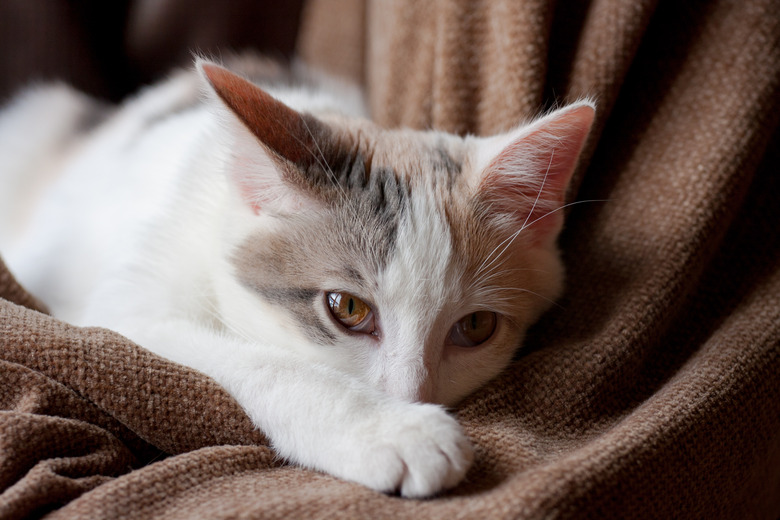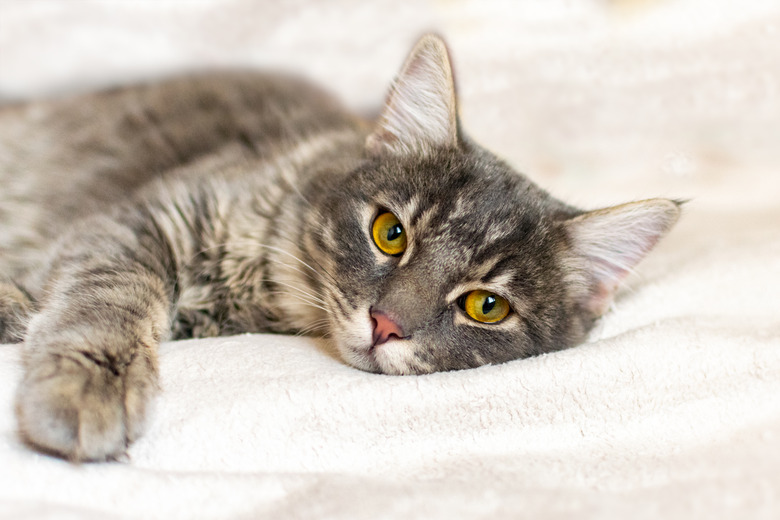Why Is A Cat Sneezing Blood With An Upper Respiratory Infection?
Feline nasal passages are sensitive conduits lined with soft tissue and small blood vessels that aid your cat's breathing and sense of smell. When you see a cat sneezing blood, it should definitely be a cause for concern of any cat parent or caregiver.
While it is rare, it's not unheard of to see your cat sneezing blood or having a bloody nose. It's when epistaxis in cats becomes heavier, or chronic, that a diagnostic workup should occur.
Cat nose bleeds, known as epistaxis, are often linked to diseases, exposure to toxins, or physical trauma. Even if your kitten has an active respiratory infection, it's possible there's also a second issue causing the bleeding.
A cat bleeding from the nose can indicate several life-threatening conditions, so talk to a veterinarian if you notice any sign of blood coming from your pet's nose. This is especially true if the feline is experiencing chronic sneezing or if the cat has a nose bleed and is not eating.
Possible causes of kitten bloody nose
Possible causes of kitten bloody nose
Cat nose bleed causes are numerous and can include a cat being exposed to human medications, such as NSAIDs, which are dangerous to cats because they can interfere with blood clotting. Keep all human medications safely out of reach of your kitty. Another cause could be the use of pesticides in and around the home, including rat poison.
Keep in mind that a kitty can ingest rat poison by killing a rodent away from home if she spends any time outdoors. Sometimes, your feline companion will bring home a piece of their catch to show off their prowess, but generally speaking, it may not be apparent to you if your pet ingested a poisoned mouse, rat, or chipmunk.
To understand nosebleeds in cats, there are a few things you should keep in mind. If you have a sneezing cat with bleeding from the nose, and especially if your cat will not eat, it is possible the kitty came in contact with rodenticide, or a poisoned mouse, mole, squirrel, or other outdoor creature. It's always a good idea to keep kitties indoors anyway because you have more control over their environment.
Accident or trauma to the nose
Accident or trauma to the nose
If ever you find your kitten bleeding from the nose, it's entirely possible that the kitten got into something, or fell and hit her face. If you witness a kitten bleeding from the nose after a fall, it's crucial to seek veterinary care as quickly as you are able. Your vet will ask if there has been an accident or trauma to the nose, if the cat plays hard with companion animals, or how else she may have been injured.
Another all-too-common cause of cat nose bleeds is vegetation such as grass awns, seed heads, or foxtails. These plant burrs or seeds can cause havoc if they get stuck anywhere, and the nose is a particularly vulnerable spot. Cats walk through tall grasses and bushes to camouflage themselves while outdoors as protection from predators, and they're very likely to pick up one of these seeds in the process.
Upper respiratory infection in felines
Upper respiratory infection in felines
Upper respiratory infections are rife in large groups of felines, such as feral colonies and shelters, so many cats suffer from the illness at some point in their lives. The vast majority of cases are viral, although up to 20 percent of infections are of bacterial origin, according to Manhattan Cat Specialists.
The most common pathogens responsible for feline respiratory infections are:
- Mycoplasma — an antibiotic-resistant bacteria
- Bordetella — proteobacteria commonly known to cause kennel cough in dogs
- Chlamydophila — an organism that causes conjunctivitis
- Feline herpes virus — sometimes called FVR
- Feline calicivirus — known as FCV
Sneezing and excessive nasal discharge are the primary symptoms of these infections. Cat sneezing may be persistent and severe, which can rupture blood vessels inside the cat's nose.
Cats suffering from a respiratory infection also may develop a fever, congestion, and eye discharge. Loss of appetite and energy is common.
Cancer or fungal infection
Cancer or fungal infection
If a cat bleeding from the nose is determined not to be the result of ruptures from excessive sneezing, then cancerous growth and fungal infection around the nasal passages are the likely suspects, according to Washington State University College of Veterinary Medicine. Benign polyps can form inside the nose and cause epistaxis. Treatment for any of these illnesses is dependent upon the cause. The cat nose bleed may be treated with drugs to kill nasal mites. Dental problems could be at fault, requiring tooth extraction surgery. With fungal infection, usually feline cryptococcus, an anti-fungal drug will be given to the kitten bleeding from the nose. This treatment may take several months.
Cancerous growths or tumors are more difficult because it's not possible to remove a tumor from inside the cat's nose, and a tumor can grow toward the brain causing neurological issues such as seizures. Some tumors can grow so large as to cause deformed facial features. To add to the difficulty, nasal tumors do not usually respond to anti-cancer drugs. In this case, radiation is used, but this treatment is pricey and usually only available at veterinary schools or large metropolitan areas.
Other illnesses that contribute to nasal bleeding include:
- Blood deficiencies, such as hemophilia and thrombocytopenia
- Cancer of the blood or bone marrow
- Feline immune deficiency virus — also known as FIV
- Feline leukemia — cat sneezing blood could be a sign of feline leukemia
Toxin exposure nose bleed
Toxin exposure nose bleed
Nosebleeds are associated with the consumption of various toxic materials, particularly pesticides and rodenticides. Cats can get sick by consuming poisoned rats, whether they are alive or dead.
Nonsteroidal anti-inflammatory drugs reduce clotting potential, which increases the risk of epistaxis. Note any medication your pet has consumed when you speak to the vet. Household painkillers often contain NSAIDs. Nosebleeds may be a sign that your kitty has consumed human medicine.
Foreign object in cat's nose
Foreign object in cat's nose
While dogs are more likely to "sniff up" small objects, felines also may get things stuck in their noses. Pointed seeds and small pieces of plant matter can scrape the inside of the nose and burst blood vessels. Objects can get sucked into the upper parts of the canal, so they are not always visible during a basic examination of the nostrils.
This is especially true with foxtails and other outdoor spiny plants that cats can breeze past while walking through tall grasses or brushy areas. Consult a veterinarian before removing anything stuck in your cat's nose. When in doubt, allow a medical professional to handle it.
Managing kitten nose bleeds
Managing kitten nose bleeds
If your cat's nose is bleeding, isolate him from other pets and family members to provide a calming environment. Hold an ice pack to the nose, leaving space for her to breathe. Contact your veterinarian once you've stabilized the situation at home yourself.
Above all, stay calm, and make sure your cat is comfortable and not in any immediate danger. Always transport cats to the vet in a crate for their safety and protection.

